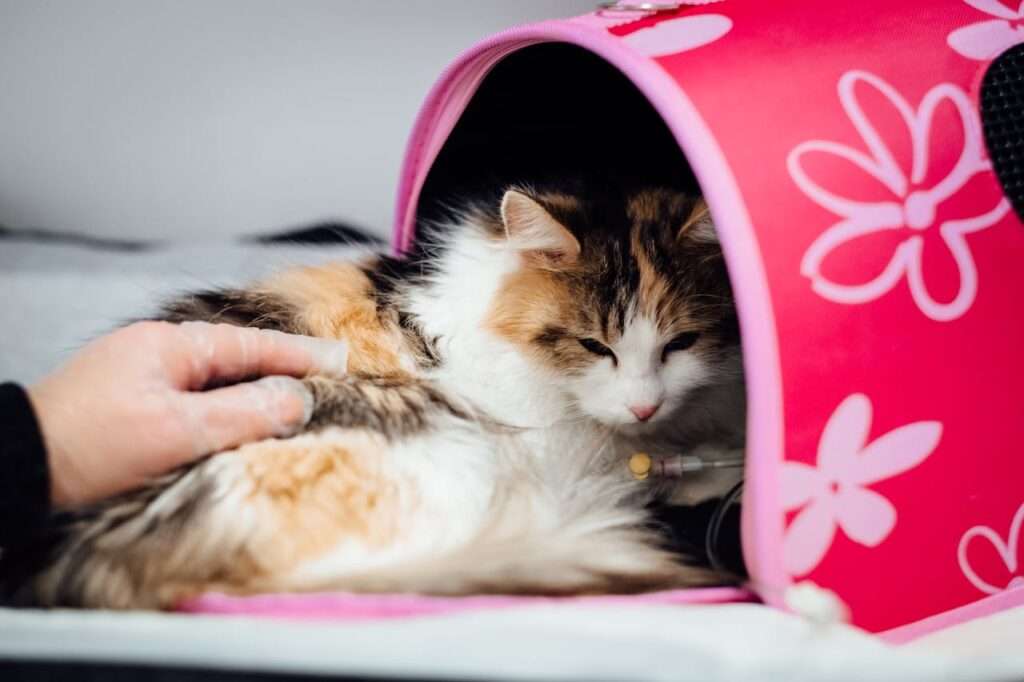Why Does My Cat Ignore Me? The Top 10 Surprising Reasons Revealed
If you’ve ever shared your home with a cat, you’re probably well aware of their enigmatic nature. Cats have a reputation for being independent and self-sufficient creatures, which is part of their charm. But what happens when your beloved feline friend seems to be giving you the cold shoulder? That’s right, we’re talking about that perplexing question: “Why does my cat ignore me?”
At BarkLikeMeow, we understand that this dilemma can be both confusing and frustrating for cat owners. We’re here to help unravel the mysteries behind your cat’s behavior and provide you with valuable insights into why they might be giving you the silent treatment.
Understanding Cat Behavior
Before delving into the reasons why your cat might be ignoring you, it’s essential to grasp the intricate world of feline behavior. Cats are not little dogs, and they don’t communicate in the same way. To decode their actions and reactions, it’s crucial to recognize their unique traits and instincts.
Cats Are Independent Creatures
Cats are descended from solitary hunters, and this evolutionary history has left a mark on their behavior. Unlike dogs, who have been bred for companionship and teamwork, cats are hardwired for independence. They’re like the cool, mysterious loners of the animal kingdom.
- Evolutionary Background: To understand your cat’s desire for solitude, it helps to look back at their ancestors. Wildcats, the ancestors of our domestic cats, were solitary hunters. They needed to rely on their own wits and skills to survive, which has shaped the independent streak we see in our furry friends today.
- Comparison to Dogs: Comparing cats to dogs is like comparing apples to oranges. Dogs have been selectively bred for specific traits over thousands of years, including loyalty and the desire to work alongside humans. Cats, on the other hand, have maintained their independence throughout history.
Communication in Cats
While cats may not communicate as openly as dogs, they have their own intricate language of gestures, vocalizations, and scents. Understanding these cues is essential for deciphering your cat’s feelings and intentions.
- Body Language: Cats are masters of non-verbal communication. Their body language speaks volumes, from the position of their ears to the way they hold their tail. Learning to read these cues can provide valuable insights into your cat’s emotional state.
- Vocalization: While cats are generally quieter than dogs, they do use vocalizations to communicate. From the familiar meow to the less common purrs, growls, and hisses, each sound conveys a different message.
- Scents: Cats also rely heavily on their sense of smell to communicate. They mark their territory with scent markings and can detect pheromones to gauge the mood of other cats in the vicinity.
Understanding these fundamental aspects of cat behavior will lay the foundation for comprehending why your cat might be ignoring you. In the following sections, we’ll delve deeper into the specific reasons behind your cat’s behavior and provide actionable tips to strengthen your bond with your feline companion.
The Reasons Behind Cat Ignoring Behavior
So, why does your cat sometimes act like you’re invisible? It turns out there are several potential reasons behind this seemingly aloof behavior. Let’s explore these factors to shed light on your cat’s mysterious actions.
Health Issues
Cats are masters at hiding discomfort or pain, which can lead to them distancing themselves from their humans. Here are some health-related reasons your cat might be ignoring you:
- Pain or Discomfort: Cats may withdraw and avoid interaction when they’re in pain. Common sources of discomfort include dental issues, arthritis, or injuries.
- Stress and Anxiety: Just like people, cats can experience stress and anxiety, which can cause changes in behavior. New environments, loud noises, or other stressors can make them seek solitude.
Environmental Factors
Your cat’s environment plays a significant role in their behavior. Changes or disruptions in their surroundings can lead to them ignoring you.
- Changes in Routine: Cats thrive on routine, so even minor changes like a shift in feeding times or litter box location can throw them off and make them less responsive.
- New Additions or Changes to the Household: Introducing a new pet, a baby, or even rearranging furniture can disrupt their sense of security and result in avoidance.
Lack of Stimulation
Cats are curious creatures, and they need mental and physical stimulation to stay engaged. When they’re bored or understimulated, they may choose to ignore you.
- Boredom: Cats are natural hunters, and without opportunities to “hunt” toys or engage in play, they may turn to solo activities or napping.
- Insufficient Playtime: Cats need daily play sessions to burn off excess energy and satisfy their hunting instincts. If they’re not getting enough play, they may disengage.
Social Structure
Cats have complex social hierarchies and territorial instincts that can impact their behavior.
- Dominance and Territory: Cats establish territories and may ignore you if they feel their space is threatened or if they’re asserting dominance.
- Socialization: Cats have varying degrees of sociability, and some may prefer solitude or interactions with other cats over human attention.
Personality Traits
Just like people, cats have unique personalities. Some cats are naturally more independent, while others are more social.
- Shy or Introverted Cats: Shy or introverted cats may take longer to warm up to people and might initially appear aloof.
- Highly Independent Cats: Some cats are content with minimal interaction and prefer to do their own thing.
Understanding these underlying factors can help you pinpoint why your cat might be ignoring you and take appropriate steps to address the issue.
Signs Your Cat May Be Ignoring You
Recognizing the signs that your cat is ignoring you is the first step in addressing the issue. Cats can be subtle in their communication, so it’s essential to be observant.
Behavioral Cues
- Avoidance: Your cat may actively avoid you by hiding or retreating to a secluded spot when you approach.
- Hiding: Cats often seek refuge in hidden places when they want to be left alone.
- Non-Engagement: They may not respond to your attempts at play or interaction, turning their attention elsewhere.
Physical Cues
- Avoiding Eye Contact: Cats communicate through eye contact, and avoiding your gaze can be a sign of disinterest.
- Tail Position: The position of your cat’s tail can indicate their mood. A puffed-up tail or a low-held tail can be a sign of stress or discomfort.
- Ears and Whiskers: Forward-pointing ears and relaxed whiskers usually indicate a content and engaged cat. Flattened ears or twitchy whiskers may suggest annoyance or anxiety.
By recognizing these cues, you can better understand when your cat is choosing to ignore you and take appropriate steps to address any underlying issues or concerns.
How to Address Health-Related Ignoring

When your cat ignores you, and you suspect it might be due to health issues, it’s crucial to take their well-being seriously. Cats are experts at masking pain and discomfort, so it’s up to you to be vigilant. Here’s how to address health-related ignoring:
- Regular Vet Check-Ups: Regular veterinary check-ups are essential for your cat’s health. Routine visits allow your veterinarian to detect and address any underlying medical issues before they become severe. Stick to a consistent schedule of wellness exams to keep your cat in top shape.
- Monitoring for Signs of Illness or Pain: Between vet visits, keep an eye out for signs of illness or discomfort, such as changes in appetite, lethargy, unusual vocalizations, or changes in litter box behavior. If you notice any of these signs, consult your veterinarian promptly.
- Providing a Comfortable Environment: Ensure your cat’s living space is comfortable and safe. Provide soft bedding, cozy hiding spots, and a warm, quiet area where they can retreat if they’re not feeling their best. This will help them feel secure and reduce stress, which can be especially important if they’re experiencing health issues.
Strategies for Dealing with Environmental Factors
Environmental factors can significantly influence your cat’s behavior and may lead to them ignoring you. Here are some strategies to help mitigate these issues:
- Gradual Introductions: When introducing changes or new additions to your cat’s environment, do so gradually. Whether it’s a new pet, a roommate, or a change in furniture, a slow and steady approach can reduce stress and help your cat acclimate more comfortably.
- Consistent Routine: Cats thrive on routine, so try to maintain a consistent daily schedule. Feeding, playtime, and other activities should happen at roughly the same times each day. Predictability can help your cat feel secure and reduce anxiety.
- Reducing Stressors: Identify and eliminate potential stressors in your cat’s environment. This may include minimizing loud noises, providing a quiet space away from heavy traffic areas, or using pheromone diffusers designed to reduce anxiety.
- Enriching the Environment: Boredom can lead to cat ignoring behavior. To combat this, enrich your cat’s environment with toys, scratching posts, interactive puzzles, and opportunities for exploration. Cats love to engage their natural hunting instincts, so interactive toys that mimic prey can be particularly stimulating.
By addressing environmental factors and providing a comfortable, enriching space, you can help your cat feel more secure and reduce their tendency to ignore you. Remember that patience is key when implementing these changes; it may take time for your cat to adjust to a new routine or environment.
Engaging Your Cat: Play and Stimulation
Engaging your cat in play and providing mental and physical stimulation is crucial to keeping them happy and active. Cats are natural hunters, and these activities help fulfill their instincts. Here’s how to keep your feline friend engaged:
- Appropriate Toys and Games: Choose toys that cater to your cat’s hunting instincts. Interactive toys like feather wands, laser pointers, or toys that mimic small prey animals can captivate their attention. Rotate their toys regularly to keep things fresh and exciting.
- Interactive Playtime: Set aside dedicated playtime each day. Engage your cat in interactive play sessions, using toys that mimic the movements of prey. Allow them to pounce, chase, and “capture” their toys—it’s great mental and physical exercise.
- Puzzle Feeders and Food Dispensers: Puzzle feeders and food dispensers make mealtime more exciting for your cat. These devices challenge them to work for their food, simulating the experience of hunting. It’s an excellent way to keep them mentally engaged.
- Creating a Safe Outdoor Space: If you have outdoor access, consider creating a secure outdoor area or using a leash and harness to allow your cat supervised outdoor adventures. Outdoor exploration can provide mental stimulation and sensory enrichment.
Understanding and Nurturing Your Cat’s Social Needs

Cats may have a reputation for independence, but they also have social needs that require attention and nurturing. Building a strong bond with your cat involves understanding their social tendencies and respecting their boundaries:
- Building Trust: Building trust is essential for a strong human-cat bond. Spend quality time with your cat, offering gentle petting and positive interactions. Avoid forcing physical contact if your cat resists; let them approach you on their terms.
- Reinforcing Positive Behavior: Reward your cat for positive behavior. Offer treats, praise, or affection when they approach you or engage in desired activities. Positive reinforcement can encourage socialization.
- Providing Personal Space: Cats appreciate having their personal space respected. Create cozy nooks or hiding spots where your cat can retreat when they need a break from interaction. Always allow them an escape route when you’re spending time together.
- Multi-Cat Households: If you have multiple cats, be mindful of their social dynamics. Cats may have varying levels of socialization, and some may prefer the company of other cats over humans. Ensure there are enough resources, such as litter boxes, food bowls, and resting spots, to prevent conflicts.
Understanding and catering to your cat’s social needs will go a long way in fostering a healthy and affectionate relationship. Remember that each cat is unique, and their preferences may vary. Patience and respect for their individuality are key to building a strong bond.
Tailoring Your Approach to Different Cat Personalities
Cats, like humans, have unique personalities that shape their behavior and preferences. Understanding your cat’s personality type can help you tailor your approach to build a stronger bond. Here are some common cat personality traits and how to adjust your interactions accordingly:
Social Butterflies
Some cats are outgoing and affectionate, often seeking attention and interaction. They enjoy being petted, held, and cuddled.
- How to Engage: Social butterflies thrive on attention, so indulge them with affection, play, and conversation. Regular interactive play sessions and cuddle time can deepen your bond.
Introverts
Introverted cats are more reserved and may take longer to warm up to people. They appreciate personal space and may prefer solitary activities.
- How to Engage: Respect their need for space and avoid forcing interactions. Provide quiet areas for them to retreat to when they need a break. Gradually build trust through gentle and patient approaches.
Highly Independent Cats
These cats are self-sufficient and enjoy autonomy. They may come and go as they please, often on their terms.
- How to Engage: Allow them the freedom to explore and do their own thing. Offer opportunities for independent play and provide access to safe outdoor spaces if possible. Respect their boundaries while still offering companionship when they’re in the mood.
Sensitive or Anxious Cats
Some cats are more sensitive to changes and may be prone to anxiety. They require a calm and predictable environment.
- How to Engage: Minimize stressors in their environment, maintain a consistent routine, and offer reassurance through gentle interactions. Avoid sudden changes that might trigger their anxiety.
Understanding your cat’s personality type and adapting your approach accordingly can lead to a happier and more fulfilling relationship. Remember that flexibility and patience are key when dealing with different personalities.
Common Mistakes to Avoid
In your quest to strengthen your bond with your feline companion, it’s essential to be aware of common mistakes that can hinder your efforts. Avoiding these pitfalls will help ensure a harmonious relationship:
- Punishment: Never punish your cat for ignoring you or exhibiting unwanted behavior. Punishment can lead to fear and anxiety, damaging the trust between you and your cat.
- Forcing Interaction: Respect your cat’s boundaries and avoid forcing them into interactions. Forcing attention can lead to avoidance behavior or even aggression.
- Ignoring Your Cat’s Needs: Ignoring your cat’s physical and emotional needs, such as playtime, mental stimulation, and a clean litter box, can lead to them ignoring you in return. Address their needs to create a happy and contented pet.
- Not Seeking Professional Help When Needed: If your cat’s ignoring behavior persists or escalates, or if you notice sudden behavioral changes, don’t hesitate to seek professional help from a veterinarian or a certified animal behaviorist. Underlying medical issues or unresolved behavioral problems may require expert guidance.
By avoiding these common mistakes and following the tips provided in this guide, you can build a strong and loving relationship with your cat, even if they occasionally choose to give you the cold shoulder. Patience, understanding, and a willingness to adapt to your cat’s unique personality are the keys to a happy and fulfilling human-cat bond.
When to Seek Professional Help

While most cat behavior issues can be addressed through patience and understanding, there are times when seeking professional help is essential. Here are some situations in which you should consider reaching out to a veterinarian or certified animal behaviorist:
- Persistent Behavior Issues: If your cat’s ignoring behavior persists despite your efforts to address potential causes, it may be a sign of a deeper issue. A professional can conduct a thorough assessment to identify any underlying problems.
- Sudden Behavioral Changes: Abrupt changes in your cat’s behavior, such as increased aggression, extreme withdrawal, or excessive vocalization, may indicate an underlying medical or psychological problem that requires expert evaluation.
- Aggression or Destructive Behavior: If your cat exhibits aggressive or destructive behavior that poses a risk to themselves, other pets, or family members, professional intervention is crucial to ensure everyone’s safety.
A certified animal behaviorist or veterinarian can conduct a comprehensive evaluation, provide a diagnosis, and develop a tailored behavior modification plan to address your cat’s specific needs.
Conclusion
Understanding why your cat may sometimes choose to ignore you is a crucial step in strengthening your bond with your feline friend. Cats are unique creatures with distinct personalities, and their behavior can be influenced by a variety of factors, from health issues to environmental changes.
By taking the time to learn about your cat’s individual needs and preferences, providing mental and physical stimulation, and respecting their boundaries, you can foster a loving and harmonious relationship. Remember that patience and understanding are key when dealing with our enigmatic feline companions.
In conclusion, the next time your cat seems to be giving you the cold shoulder, approach the situation with empathy and a willingness to adapt. With the right approach and a deep commitment to your cat’s well-being, you can build a strong, enduring bond that will bring joy and companionship for years to come.
Frequently Asked Questions
Why does my cat ignore me when I call their name?
Cats may not respond to their names for various reasons, including independence or unfamiliarity with the name. It’s essential to use positive reinforcement to associate their name with rewards.
Is it normal for cats to ignore their owners when they’re busy with other activities?
Yes, cats can focus on their activities and may appear to ignore you when they’re engaged in play, grooming, or resting. This behavior is generally normal.
What should I do if my cat suddenly starts ignoring me after bringing a new pet into the home?
Introducing a new pet can disrupt your cat’s routine. Gradual introductions, separate living spaces, and providing individual attention can help reduce stress and improve their behavior.
How can I engage my cat in play to prevent them from ignoring me?
Engage your cat with interactive toys, such as feather wands or treat puzzles. Regular play sessions and offering mental stimulation can reduce boredom and increase your cat’s interest in you.
Why does my shy cat ignore me, and how can I build trust with them?
Shy cats may need time to build trust. Offer treats, create a safe and quiet space, and let them approach you at their own pace to establish a stronger bond.
Can I train my cat to be more social and less likely to ignore me?
You can encourage socialization through positive reinforcement and gradual exposure to new experiences. However, remember that each cat has a unique personality, and respect their comfort levels.
When should I seek professional help for my cat’s ignoring behavior, and what can a vet or behaviorist do?
If your cat’s ignoring behavior persists or escalates, consult a veterinarian or certified animal behaviorist. They can assess potential underlying issues and create customized behavior modification plans.
Are there age-related reasons why my cat may ignore me more as they get older?
Cats may become less active or more independent with age, which can affect their behavior. However, sudden or significant changes in behavior should be evaluated by a veterinarian.
How can I avoid common mistakes when trying to reduce my cat’s ignoring behavior?
Avoid punishing your cat, forcing interactions, or neglecting their needs. Instead, focus on positive reinforcement, respecting their boundaries, and seeking professional help when necessary.
Why do some cats seem to ignore me when I approach them, but not others?
Cats have varying degrees of sociability, and their responses can differ based on their individual personalities and experiences. Some cats may be more naturally aloof, while others are more outgoing and receptive to human interaction. Respect each cat’s unique disposition and boundaries.





